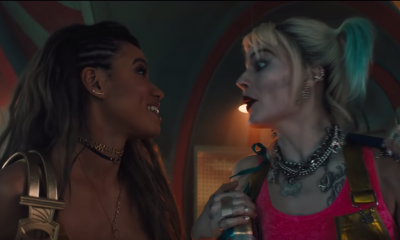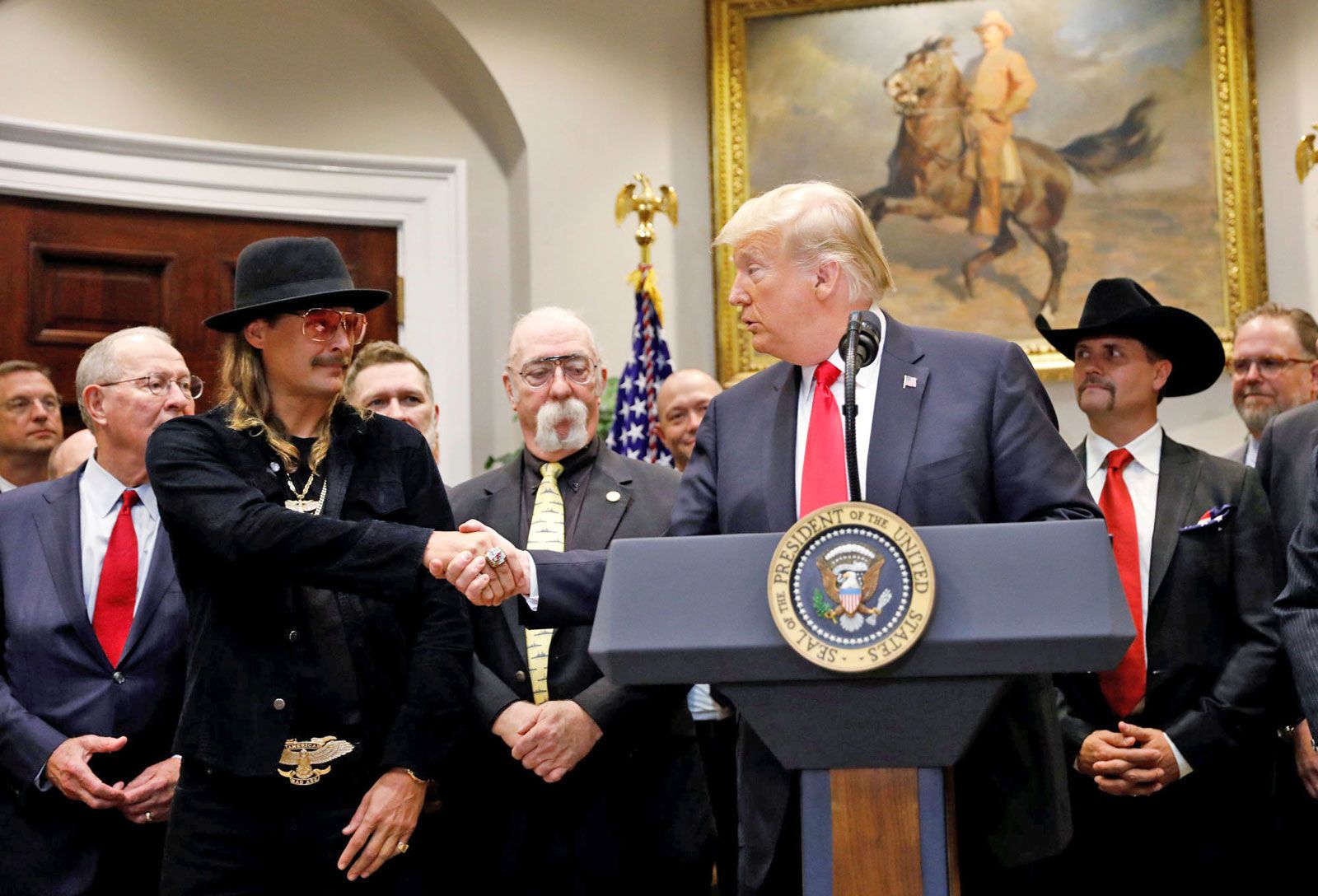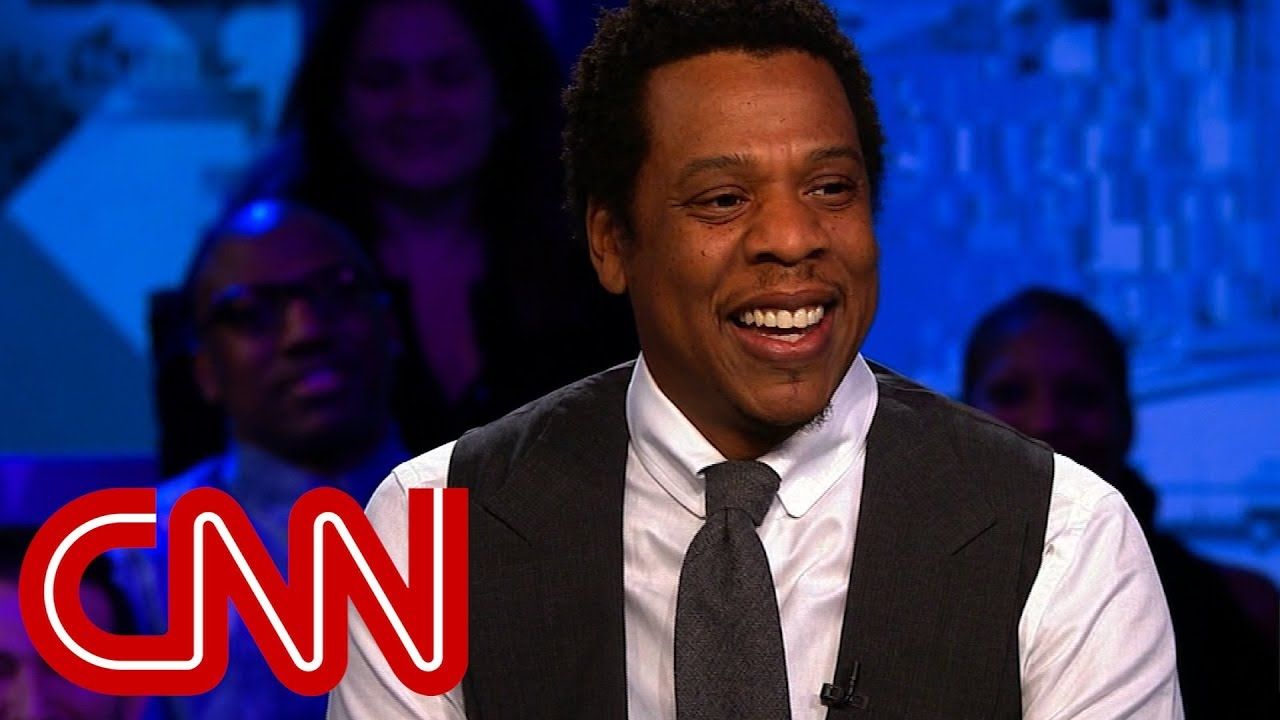At long last the Music Modernization Act was signed into law today by President Donald Trump, witnessed by a smattering of industry executives and such recordings artists as Kid Rock and John Rich, the president’s besties.
After an effort that began years ago and was renewed last year, the compromise legislation, which ultimately took much more compromise than the initial version of the bill anticipated, will present a whole new set of business conditions on the music publishing industry that hopefully will be worth with the reward of higher rates for songwriters and publishers.
“The Music Modernization Act closes loopholes in our digital royalties laws to ensure that songwriters, artists and producers receive fair payment for licensing of music,” Trump said just before signing the law. “I’ve been reading about this for many years and never thought I’d be involved in it, but I got involved in it. They were treated very unfairly. They’re not going to be treated unfairly anymore.”
Trump-friendly artists in attendance included Kid Rock, Beach Boys singer Mike Love and country singers Craig Morgan and John Rich. The ceremony was also attended by Christian rock group MercyMe and Doobie Brothers guitarist Jeff “Skunk” Baxter, who has gone on to a career as a missile defense consultant. Another artist expected to be at the White House, Kanye West, was nowhere to be seen.
Soul legend Sam Moore of Sam & Dave noted that the legislation has been a long time coming. “With Mr. Bush we couldn’t get it done. When Mr. Obama was in we couldn’t get it done. But we got it done with this man,” the “Soul Man” singer said in brief remarks.
“The Music Modernization Act is finally the law of the land,” National Music Publishers Assn. president and CEO David Israelite said in a statement. “Songwriters have for too long labored without seeing fair rates and receiving all that they deserve, and for the first time in history, the music industry has partnered with the tech industry to fix these systemic problems. As we embark on supporting and helping build the critical structures within the MMA, we are humbled by the extraordinary progress propelled by compromise and the unprecedented political involvement of music creators. Today is about their future and this bill stands as a great statement on what can be done when we work together.”
Another component of the bill, the Classics Act, will finally make sure that artists with pre-1972 records will receive master recording performance royalties; while a third component codifies a process by which SoundExchange can pay producers and engineers the royalties accorded to them by their agreements with artists.
“The Music Modernization Act is now the law of the land, and thousands of songwriters and artists are better for it,” RIAA president Mitch Glazier said. “The result is a music market better founded on fair competition and fair pay. The enactment of this law demonstrates what music creators and digital services can do when we work together collaboratively to advance a mutually beneficial agenda. It’s a great day for music. We hope fans across the country will join with us in celebration and PLAY IT LOUD.”
Recording Academy president and CEO Neil Portnow likewise applauded the signing of the legislation. “As we celebrate the harmony and unity that got us here, we applaud the efforts of the thousands of performers, songwriters, and studio professionals who rallied for historic change to ensure all music creators are compensated fairly when their work is used by digital and satellite music services,” he said in a statement. “We thank the members of Congress who championed this issue throughout the past several years to bring music law into the 21st century.”
But once the bill is signed the real hard work begins, especially with regards to the music publishing portion of the law. In addition to changing some standards by which songwriting royalty rates are set by the Copyright Royalty Board and the ASCAP and BMI rate courts, the MMA creates a blanket mechanical license and a collective to oversee that process and administer the collection, payments and reporting to songwriters and publishers.
“The signing of the Music Modernization Act into law, by the President, is the culmination of a gargantuan struggle that was resolved by an unparalleled alliance between all music industry stakeholders and the relevant tech companies,” A2IM CEO Richard Burgess said in a statement. “In this digital age, more music is enjoyed by more people than at any time in the history of humankind. The signing of this bill represents a significant step towards better lives for music creators and those that support them. A standing ovation is greatly deserved for all involved in this historic achievement.”
Yet, sources have been suggesting to Billboard since the beginning of the effort to get the MMA passed that now the real infighting will begin over the set-up and regulations.
Moreover, the collective is supposed to build an industry-wide, comprehensive public database that will match compositions to recordings, an ambitious undertaking that has yet to be successfully completed in past industry attempts.
Furthermore, for the first few years of the MMA collective’s operation, the administrators that expected to lose business as a result of the legislation — like Music Reports Inc., the Harry Fox Agency, Audiam and others — will probably enjoy a boon in business as the publishers that can afford it will likely hire them to double check the Collective to make sure it is accurately doing its job, sources says.
“Today, President Trump signed the bi-partisan Hatch-Goodlatte Music Modernization Act (The MMA), which will finally bring music copyright laws into the digital age,” according to a statement issued by John Josephson, chairman/CEO of SESAC, which owns HFA. “We applaud everyone’s hard work and tireless efforts on this legislation, especially the Senators who worked diligently to get the bill passed then adopted by the House. We’re grateful for our committed songwriting and publishing community whose focus and passion have strengthened our industry for generations to come.”
As part of the legislation, rate regulators now have to consider the marketplace and try to duplicate a willing buyer/seller standard when setting rates. Moreover, the legislation gets rid of two elements of copyright law that songwriters and publishers felt were depressing rates, “pre-existing services” that received special considerations when rates are being set; and not being able to cite the rates being paid to record labels and artist. By eliminating both rules, the rate regulators can now consider how much record labels are being paid when setting music publishing rates.
“A young songwriter once wrote, ‘You give a little love and it all comes back to you; You’re gonna be remembered for the things that you say and do, ASCAP chairman/president and songwriter Paul Williams said in a statement. “Decades later, this could not be more true. Songwriters across this country now and in the future will remember those who fought so hard for the Music Modernization Act—both in Congress and across the music industry. On behalf of the music community, we are so thankful for the love and will return the favor with music for generations to come.”
Those sentiments were echoed by songwriter Ross Golan. “The music industry’s past was built on the backs of artists and songwriters,” according to a statement from Golan, a member of Songwriters of North America. So it’s fitting that artists and songwriters are carrying the industry into the future. We are no longer the exploited sleeping giant. We are here and we are organized. We were told uniting songwriters is like herding cats. Well we did and now we are a Pride of Lions.”
Along the way, when some industry parties were complaining to Congress because the MMA would likely hurt their business models, SONA and the National Songwriters International Assn. members bombarded social media, calling them out and putting pressure on them to get on board. However, it was the Congressional leadership that knocked heads together and made all parties sit down and enact further compromises to the bill.
While songwriters are expected to enjoy better payouts from the law, on-demand services derive a huge benefit too in that the blanket license insures that they won’t be hit with copyright infringement lawsuits if they follow the rules correctly.
In a statement Spotify applauded the legislation, calling the way it previously had to do business as outdated. “One of our core missions at Spotify is to enable a million artists to make a good living from what they love: creating and performing music,” Spotify’s general counsel and VP of business & legal affairs Horacio Gutierrez, said in a statement. “The Music Modernization Act is a huge step towards making that a reality, modernizing the outdated licensing system to suit the digital world we live in. The MMA will benefit the music community and create a more transparent and streamlined approach to music licensing and payment for artists.”
The inability of the services themselves, and in some instances the administrator they higher, had resulted in some very high profile and very expensive lawsuits over unpaid royalties from the services. Most of those suits have been settled, but Spotify still has to wrestle with a $1.6 billion suit filed by Wixen Music Publishing in the last days of 2017.
Since the MMA precludes copyright infringement lawsuits being filed—if digital services abide by all the rules and regulations that are set forth by the collective — and is retroactive back until Jan. 1, 2018, Wixen had to rush to file its lawsuit, which is still outstanding. Beyond that, industry sources expect this portion of the bill to face further legal challenges.
In another change, going forward the PRO rate courts will be rotated among the Judges of the U.S. Southern District of New York, Previously, all cases were heard by BMI rate court Judge Louis Stanton and ASCAP rate court Judge Denise Cote.
“Thanks to the unrelenting efforts of our ASCAP music creator and publisher members, industry partners and champions in Congress, a more sustainable future for songwriters is finally within reach,” ASCAP CEO Elisabeth Matthews said in a statement. “The MMA’s unanimous passage in the House and Senate proves that the power of music is a great unifier. ASCAP is gratified to have stood alongside creators, music publishers, and many more to make this dream a reality.”
Added BMI president and CEO Mike O’Neill: “This is truly a historic moment for the music industry, especially for the American songwriters and composers at its core, who will see significant and deserved benefit from this legislation. Passage of the Orrin G. Hatch-Bob Goodlatte Music Modernization Act was a hard-fought process that hinged on tremendous collaboration and unprecedented support among diverse stakeholders who ultimately united to safeguard the future of music. We are gratified by this extraordinary outcome that recognizes the essential contributions of creators and streamlines the use of their music across businesses. While BMI will keep advocating to protect the livelihood of music creators in the digital age, we thank Congress and the President for taking this important step in implementing the most meaningful music licensing reform in decades.”
Likewise SONA executive directors Michelle Lewis and Kay Hanley noted in a statement, “SONA and its membership of working songwriters would like to express heartfelt thanks to Congress and to our fellow music business stakeholders for accomplishing what everyone thought was impossible: Compromise, consensus, and passage of the Orrin G Hatch – Bob Goodlatte Music Modernization Act. As President Trump signs our bill into law, today marks another momentous event in the rich history of music and the people who create it.”
In fact, getting President Trump to sign the legislation was the last hurdle for the MMA to become law of the land. A minority of industry executives were worried that the president, known for his vindictive streak, might hesitate to sign the legislation if he was reminded that songwriters and artists were largely against his election in the first place; and that rights holders have a tendency to cry copyright infringement when a Republican politician uses their music in their campaigns.
However, others pointed out that even if Trump vetoed, the legislation, which passed with unanimous bipartisan approval by both Congressional bodies could easily muster enough votes to override any last minute stubbornness by the president.
In the end he did sign the legislation, and as lawyer and SONA advisor Dina LaPoltnoted in a statement, “Music’s unifying power helped opposing communities reach across party lines to pass the Music Modernization Act with unanimous congressional support. The President’s final signature now enshrines the MMA in U.S. law, protecting music creators for generations to come. I couldn’t be more proud of SONA and all the songwriters who engaged the entire music creator community to help get this over the line! Now the real work begins!”
True that, onward to setting up the Collective.

 Film & Television5 years ago
Film & Television5 years ago
 Film & Television5 years ago
Film & Television5 years ago
 10 years ago
10 years ago
 Film5 years ago
Film5 years ago
 Music3 years ago
Music3 years ago
 Film5 years ago
Film5 years ago
 Film5 years ago
Film5 years ago
 Music5 years ago
Music5 years ago













